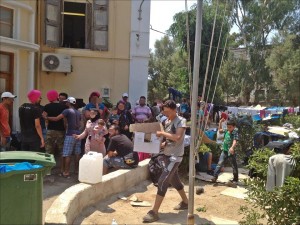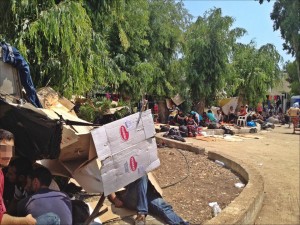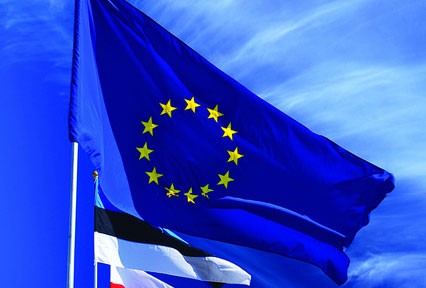This post was contributed by Dr Julie Peakman, honorary fellow at Birkbeck’s Department of History, Classics and Archaeology. Dr Peakman is currently in Leros, Greece, on a research trip for her next book, but is also volunteering at the port police, offering help for refugees.
Leros is currently experiencing a huge influx of refugees – mainly Syrian and Afghan – arriving on its shores. Here, Dr Peakman writes for Birkbeck Blogs about her volunteering activity and the situation on Leros.
Yesterday morning when we arrived at the port police, there were three-hundred refugees waiting in the hot sun in Lakki police station without food or water.
They had been given no food last night and the only thing they had eaten was the croissants and biscuits volunteers had given them the morning before. It is a tinderbox waiting to be lit.
The police say they have no money to pay the restaurants so the restaurants will no longer supply food as they have not been paid (only five euros per refugee, but it was something). There are only a handful of port police struggling to cope with the situation. The government has no money to send the police. Even the simple basic of water is not being supplied by the authorities.
The water tank for the refugees has not been filled for days and we wonder why this has not yet happened. The police had to take the water which volunteers had bought down to Lakki port over to more refugees in Xerocampus, at the other side of the island. These poor people are lying in the streets with nowhere to sleep while a building stands empty waiting for plumbing to be connected. This would take a couple of hours.
There is one young woman from the United Nations who says she only gives verbal advice to the refugees to tell them their rights. When I asked her why the United Nations Refugee Council are not doing anything to send food, water, shelter or clothes, she said the United Nations has not declared the situation a humanitarian crisis and she said that is the policy made in Geneva.
Meanwhile, my wonderful friends, Chris Angiel, Stella H Perlman and Patrick Muldowney made 200 sandwiches to give out to those who had no money and could not leave the station as they had not been ‘processed’.
Donations of juice, milk, nappies, soap, clothes and new flip flops were given out to as many people as we could. A wonderful Dutch couple have collected clothes from all their fellow yachties to give out to refugees. After four hours working with Patrick and a stalwart of the action Anne Tee in cramped and hot conditions, most of the refugees had at least been fed and watered. Anne goes down every morning and evening.
I am afraid I welled up when one of the people who spoke English came over and said on behalf of everyone there they would like to thank me and the other volunteers for our help. I felt very humble. The miracle worker behind all this organisation is Martina Katsiveli who is struggling to get a building opened for the refugees so they can have showers and toilet facilities. At the moment, they have one toilet.
View the Guardian’s report of the migrant crisis in Leros
Find out more
Pictures courtesy of Anne Tee








